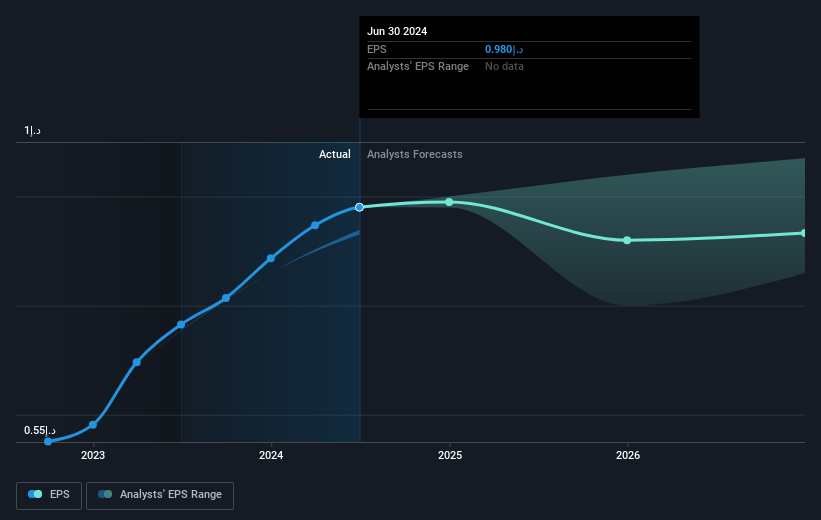- United Arab Emirates
- /
- Banks
- /
- ADX:RAKBANK
Investors in National Bank of Ras Al-Khaimah (P.S.C.) (ADX:RAKBANK) have seen favorable returns of 86% over the past three years

One simple way to benefit from the stock market is to buy an index fund. But many of us dare to dream of bigger returns, and build a portfolio ourselves. For example, The National Bank of Ras Al-Khaimah (P.S.C.) (ADX:RAKBANK) shareholders have seen the share price rise 57% over three years, well in excess of the market return (33%, not including dividends).
Now it's worth having a look at the company's fundamentals too, because that will help us determine if the long term shareholder return has matched the performance of the underlying business.
See our latest analysis for National Bank of Ras Al-Khaimah (P.S.C.)
While markets are a powerful pricing mechanism, share prices reflect investor sentiment, not just underlying business performance. By comparing earnings per share (EPS) and share price changes over time, we can get a feel for how investor attitudes to a company have morphed over time.
National Bank of Ras Al-Khaimah (P.S.C.) was able to grow its EPS at 58% per year over three years, sending the share price higher. The average annual share price increase of 16% is actually lower than the EPS growth. So one could reasonably conclude that the market has cooled on the stock. This cautious sentiment is reflected in its (fairly low) P/E ratio of 5.26.
The image below shows how EPS has tracked over time (if you click on the image you can see greater detail).

We know that National Bank of Ras Al-Khaimah (P.S.C.) has improved its bottom line over the last three years, but what does the future have in store? Take a more thorough look at National Bank of Ras Al-Khaimah (P.S.C.)'s financial health with this free report on its balance sheet.
What About Dividends?
When looking at investment returns, it is important to consider the difference between total shareholder return (TSR) and share price return. The TSR incorporates the value of any spin-offs or discounted capital raisings, along with any dividends, based on the assumption that the dividends are reinvested. So for companies that pay a generous dividend, the TSR is often a lot higher than the share price return. As it happens, National Bank of Ras Al-Khaimah (P.S.C.)'s TSR for the last 3 years was 86%, which exceeds the share price return mentioned earlier. The dividends paid by the company have thusly boosted the total shareholder return.
A Different Perspective
We regret to report that National Bank of Ras Al-Khaimah (P.S.C.) shareholders are down 2.3% for the year (even including dividends). Unfortunately, that's worse than the broader market decline of 0.8%. However, it could simply be that the share price has been impacted by broader market jitters. It might be worth keeping an eye on the fundamentals, in case there's a good opportunity. On the bright side, long term shareholders have made money, with a gain of 13% per year over half a decade. It could be that the recent sell-off is an opportunity, so it may be worth checking the fundamental data for signs of a long term growth trend. While it is well worth considering the different impacts that market conditions can have on the share price, there are other factors that are even more important. To that end, you should learn about the 2 warning signs we've spotted with National Bank of Ras Al-Khaimah (P.S.C.) (including 1 which is significant) .
We will like National Bank of Ras Al-Khaimah (P.S.C.) better if we see some big insider buys. While we wait, check out this free list of undervalued stocks (mostly small caps) with considerable, recent, insider buying.
Please note, the market returns quoted in this article reflect the market weighted average returns of stocks that currently trade on Emirian exchanges.
Valuation is complex, but we're here to simplify it.
Discover if National Bank of Ras Al-Khaimah (P.S.C.) might be undervalued or overvalued with our detailed analysis, featuring fair value estimates, potential risks, dividends, insider trades, and its financial condition.
Access Free AnalysisHave feedback on this article? Concerned about the content? Get in touch with us directly. Alternatively, email editorial-team (at) simplywallst.com.
This article by Simply Wall St is general in nature. We provide commentary based on historical data and analyst forecasts only using an unbiased methodology and our articles are not intended to be financial advice. It does not constitute a recommendation to buy or sell any stock, and does not take account of your objectives, or your financial situation. We aim to bring you long-term focused analysis driven by fundamental data. Note that our analysis may not factor in the latest price-sensitive company announcements or qualitative material. Simply Wall St has no position in any stocks mentioned.
About ADX:RAKBANK
National Bank of Ras Al-Khaimah (P.S.C.)
Provides retail, Islamic, and commercial banking products and services to individuals and businesses in the United Arab Emirates.
Solid track record with excellent balance sheet.


